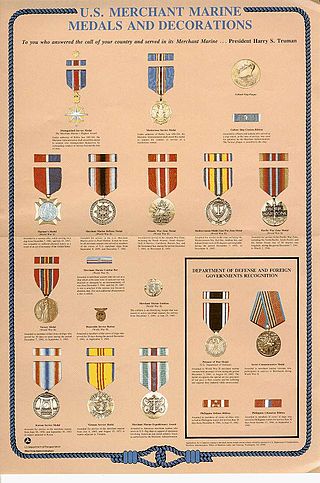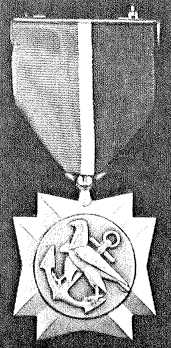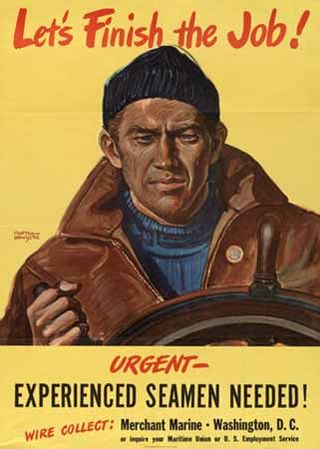
The United States Merchant Marine is composed of United States civilian mariners and U.S. civilian and federally owned merchant vessels. Both the civilian mariners and the merchant vessels are managed by a combination of the government and private sectors, and engage in commerce or transportation of goods and services in and out of the navigable waters of the United States. The Merchant Marine primarily transports domestic and international cargo and passengers during peacetime, and operate and maintain deep-sea merchant ships, tugboats, towboats, ferries, dredges, excursion vessels, charter boats and other waterborne craft on the oceans, the Great Lakes, rivers, canals, harbors, and other waterways. In times of war, the Merchant Marine can be an auxiliary to the United States Navy, and can be called upon to deliver military personnel and materiel for the military.

The United States Merchant Marine Academy is a United States service academy in Kings Point, New York. It trains its midshipmen to serve as officers in the United States Merchant Marine, branches of the United States Armed Forces and the transportation industry. Midshipmen are trained in different fields such as marine engineering, navigation, ship's administration, maritime law, personnel management, international law, customs, and many other subjects important to the task of running a large ship.

The United States Maritime Administration (MARAD) is an agency of the United States Department of Transportation. MARAD administers financial programs to develop, promote, and operate the U.S. Maritime Service and the U.S. Merchant Marine. In addition it conducts research and development activities in the maritime field; regulates the transfer of U.S. documented vessels to foreign registries; maintains equipment, shipyard facilities, and reserve fleets of Government-owned ships essential for national defense.
Its programs promote the use of waterborne transportation and its seamless integration with other segments of the transportation system, and the viability of the U.S. merchant marine. The Maritime Administration works in many areas involving ships and shipping, shipbuilding, port operations, vessel operations, national security, environment, and safety. The Maritime Administration is also charged with maintaining the health of the merchant marine, since commercial mariners, vessels, and intermodal facilities are vital for supporting national security, and so the agency provides support and information for current mariners, extensive support for educating future mariners, and programs to educate America's young people about the vital role the maritime industry plays in the lives of all Americans.

Awards and decorations of the United States Merchant Marine are civilian decorations of the United States which are issued to the members of the United States Merchant Marine for a variety of duties both in peace and war. Originally authorized to be issued by the War Shipping Administration of the World War II era, these awards were later issued by the Maritime Commission and are currently issued by the Department of Transportation's Martitime Administration.

The Merchant Marine Distinguished Service Medal is a decoration of the United States Merchant Marine (USMM). The decoration is the highest award which can be bestowed upon members of that service. It is awarded to any seaman in the USMM who, on or after September 3, 1939, has distinguished himself during the war by outstanding conduct or service in the line of duty. Regulations state that not more than one medal shall be issued to any one seaman, but for each succeeding instance sufficient to justify the award of a medal, there will be awarded a suitable insignia to be worn with the medal.
The maritime history of the United States is a broad theme within the history of the United States. As an academic subject, it crosses the boundaries of standard disciplines, focusing on understanding the United States' relationship with the oceans, seas, and major waterways of the globe. The focus is on merchant shipping, and the financing and manning of the ships. A merchant marine owned at home is not essential to an extensive foreign commerce. In fact, it may be cheaper to hire other nations to handle the carrying trade than to participate in it directly. On the other hand, there are certain advantages, particularly during time of war, which may warrant an aggressive government encouragement to the maintenance of a merchant marine.

The Merchant Marine Meritorious Service Medal is a decoration of the United States Merchant Marine. It is awarded to any seamen of any ship operated by or for the War Shipping Administration who is commended by the Administrator for conduct or service of a meritorious nature, but not sufficient to warrant the Merchant Marine Distinguished Service Medal. Regulations state that not more than one medal shall be issued to any one seaman, but for each succeeding instance sufficient to justify the award of a medal, there will be awarded a suitable insignia to be worn with the medal.

The Merchant Marine Medal for Outstanding Achievement is a decoration of the United States Merchant Marine awarded by the United States Maritime Administration. It was established in 2002 and is awarded to members of the maritime industry who have made extraordinarily valuable contributions to the merchant marine.
[A]warded to recognize merchant mariners who have participated in an act or operation of humanitarian nature directly to an individual or groups of individuals. This medal may be awarded to those leaders in the maritime industry who have dedicated years of service or achievement and/or given an extraordinary valuable contribution or work to the maritime industry. This medal requires the Maritime Administrator’s approval for award.
The Merchant Marine Gallant Ship Citation is an award of the United States Merchant Marine. The award is presented as a bronze plaque to vessels, with officers and crew being awarded a ribbon bar to denote the award. Both United States flagged vessels and foreign flagged vessels are eligible for the award.

The Merchant Marine Mariner's Medal is a decoration of the United States Merchant Marine. Because the Merchant Marine was not considered a branch of the U.S. Armed Forces, the Purple Heart was not available to Merchant Mariners; as such, the Mariner's Medal was established by an Act of Congress on 10 May 1943 to solve this dilemma.
The United States merchant marine forces matured during the maritime history of the United States (1900–1999).
The Merchant Marine Combat Bar was a decoration of the United States Merchant Marine. The decoration was established by an Act of Congress on 10 May 1943.

The Merchant Marine Defense Medal (Bar) is a decoration of the United States Merchant Marine. The decoration was established by an Act of Congress on August 14, 1944.

The Merchant Marine Atlantic War Zone Medal (Bar) is a decoration of the United States Merchant Marine established by an Act of Congress on May 10, 1944.

The Merchant Marine Mediterranean-Middle East War Zone Medal (Bar) is a decoration of the United States Merchant Marine established by an Act of Congress on May 10, 1944.
The Merchant Marine Korean Service Medal (Ribbon) is a decoration of the United States Merchant Marine awarded for service during the Korean War.
The Merchant Marine Vietnam Service Medal (Ribbon) is a decoration of the United States Merchant Marine authorized on May 20, 1968.

The Merchant Marine World War II Victory Medal is a decoration of the United States Merchant Marine established by an Act of Congress on August 8, 1946.

The SS Baton Rouge was a cargo Victory ship built during World War II under the Emergency Shipbuilding program. The Baton Rouge (MCV-846) was a type VC2-S-AP2 Victory ship built by Bethlehem-Fairfield Shipyards. The Maritime Administration cargo ship was the 846rd ship built. Her keel was laid on June 21, 1945. She was launched on August 22, 1945, and completed on September 24, 1945. The 10,600-ton ship was constructed for the Maritime Commission. The American Export Line and later the Isthmian Steamship Company operated her under the United States Merchant Marine act for the War Shipping Administration.

World War II United States Merchant Navy was the largest civilian Navy in the world, which operated during World War II. With the United States fighting a world war in all the world oceans, the demand for cargo and fuel was very high. Cargo and fuel was needed around the world for the United States Navy, United States Army, United States Marine Corps, United States Army Air Forces, United States Coast Guard and the support of the allied nations of the United States. American steamship companies chartered ships from the Maritime Commission and War Shipping Administration to meet the demand. Many United States Merchant Marine ships were newly built in the Emergency Shipbuilding Program, other ships were older World War I ships that were put back in service, or private ships acquired under Emergency war requisitions. The Merchant Navy operated in the Pacific War and European war. Over 200 US Merchant ships took part in the D-day Normandy landings. To make a Normandy breakwater Harbor, called Mulberry harbour, 33 merchant ships were sunk 1,000 yards from shore. Some of the ghosts merchant ships used were damaged and others were deemed too old.
















